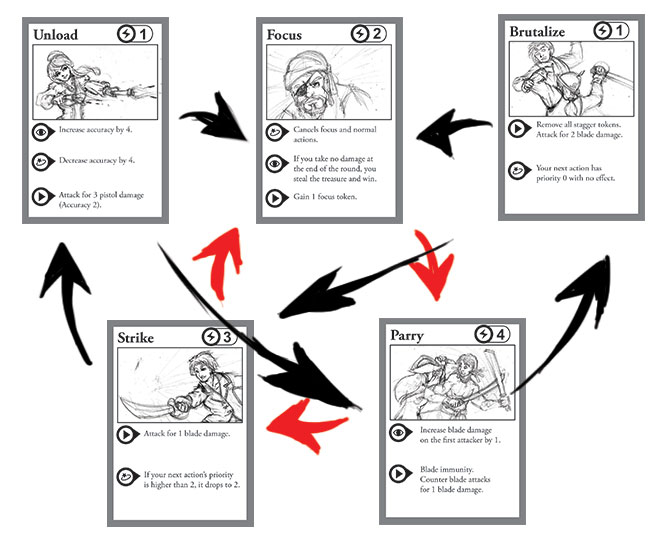Staggering as a status was added to the game to resolve some of the hard counters between cards. Focus was added to shift the attributes of the cards so the counters would work differently from one turn to the next. This is all nice and well, except... well, it isn't. The web of cause and effect gets fairly difficult to explain, and ultimately the complexity counteracts the attempt to reduce a sense of randomness to the card choice - between the focus buff and the stagger debuff, there's way too many combinations of resolutions for any normal player to keep track of.
And then there's the multiplayer version of this game, where you choose an attack and aim it at another player, then they still simultaneously resolve by order of priority... it's just chaos from that point on. Honestly, I would still like to run a small test with these rules just to see how chaotic the attack guessing game goes, but I never got a chance over last week, and I felt like the premise should stay, but I should stop trying to make the game so deterministic.
Let's introduce some chaos into the game.
I watched a rerun of Dead Man's Chest again over the weekend (is TNT just showing this movie every other week?), and the bar fight scene gave me an idea. Let's remove focus and brutalize and start fresh with a new trinity:
Now, let's change Unload into some form of liquor. "Unloading" now means smashing the bottle on someone's head. We'll also untangle all the priorities and simultaneous resolution so besides parrying to counter, all the actions are played one card at a time. We've untangled the game completely and now we're just playing a basic "take that" game (every turn a player toss a damage dealing card, some cards are there to block attacks, etc).
But the liquor part of the game can get interesting. Suppose there's a running tab on the amount of liquor smashed and consumed, wouldn't it make sense that the guys who lose the fight would have to pay the tab somehow? What if the liquor can be consumed to strengthen strikes? We arrive at the following rules:
- There are three main types of cards, punch, block, and liquor.
- Liquor can be consumed or smashed onto other people.
- if you drink it, you play it in front of you and the cost adds to your personal tab, but your punches becomes stronger and you draw more cards based on the cost of the liquor, gaining a significant advantage.
- if you smash it, you use the card as an attack on another player. The discarded bottle adds to a growing pool of damage tab that someone will have to pay.
- Punch card deals direct damage. Every drink you have makes your punch stronger.
- Blocks reduce or deflect damage, and are played as reactions to other players' attacks.
- If a player sustains X damage, he or she is knocked out and must pay for everything in the damage tab.
- A player can also play a card to try and walk out of the bar fight. If he or she is attacked that turn, that player can't block and the attempt to walk out also fails. If the player does walk out of a fight:
- if multiple players walk out on the same turn, they share whatever has to be paid off that turn.
- if there's still players left, add up the personal tabs of the players leaving and each player pays an even share.
- otherwise, you'll have to pay an even share for the damages as well.
- When there's only unconscious players left in the bar, all unconscious players must pay an even share of everything that's not paid for.
- To give the player who is most invested in the fight an advantage, whoever is the most drunk (with the biggest personal tab) can go first.
If the numbers work out right, there should be an escalation of cost built into the game that'd make it interesting for players to decide when to stay and when to quit. There's a much bigger factor of randomness, but I think the new design is "light" enough that more randomness might actually make the game better.
And now, back to assigning numbers. I hate this part.





No comments:
Post a Comment